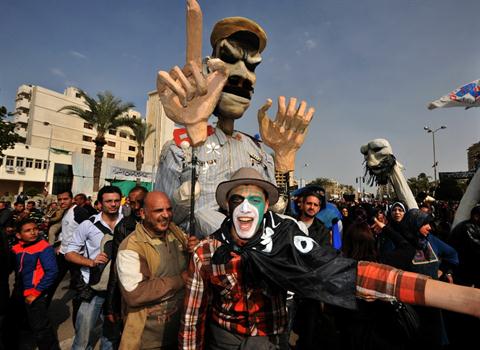By Marwa Al-A’asar
CAIRO: An analyst on Wednesday described the temporary handling of the caretaker government by sacked ministers as “a politically unusual situation,” as the swearing-in of 14 ministers-designate was delayed till Thursday.
The swearing in ceremony of the new Cabinet before the head of the ruling Supreme Council of the Armed Forces (SCAF) Field Marshal Mohamed Hussein Tantawy has been postponed more than once over the past few days.
Prime Minister Essam Sharaf was hospitalized briefly on Monday after naming 13 ministers on Sunday and two deputies on Saturday. Unconfirmed reports suggested there were disagreements over the names suggested by Sharaf. On Tuesday, he gave orders to the former ministers to remain in office until the new ones officially give their service oath.
“This has even intensified the state of confusion in the country’s political scene,” Emad Gad, a senior researcher at Al-Ahram Center for Political and Strategic Studies, told Daily News Egypt.
Businessman Ahmed Fekry turned down the position of Trade and Industry minister, while archeologists objected to the appointment of Abdel-Fattah El-Banna, to replace Zahi Hawass as the minister of state for antiquities.
“Sharaf should have studied well the CVs of the nominees he chose so as to avoid any possible objections,” Gad said.
On Wednesday, Sharaf resumed efforts to finalize his cabinet reshuffle, according to cabinet spokesman Mohamed Hegazy.
Cabinet sources said Sharaf, 59, was not in Cabinet on Wednesday and discussions with ministerial candidates were conducted by telephone.
“The new ministers in Prime Minister Essam Sharaf’s government will be sworn in on Thursday in front of the head of the Supreme Council of the Armed Forces, Field Marshal Hussein Tantawi,” a military official told the state MENA news agency.
Sharaf assigned earlier this week Ali El-Silmi and Hazem El-Beblawi as his two deputies to replace Yehia El-Gamal who had resigned last week. El-Beblawi is to oversee economy-related matters as well as head the finance ministry, while El-Silmi is to be in charge of the political development and democratic transition.
Last week, the premier said in a televised speech he would reshuffle his cabinet in response to demands to remove number of ministers, some of whom belong to the ousted regime.
He also vowed to purge the interior ministry of police officers and top officials accused of killing and injuring peaceful protesters on the first days of the January 25 uprising that toppled the Hosni Mubarak regime in February.
The PM further said he had decided to change the governors of Egypt’s 27 provinces before the end of July to meet public aspirations.
The announcements came amid nationwide protests and sit-ins that erupted on July 8, calling for multiple social and political demands.
The numbers of protesters, however, have since dropped in Tahrir Square and other parts of Egypt in the past few days.
On Wednesday, Sharaf made the first public appearance following his recovery on Wednesday during the graduation ceremony at the Egyptian Military Academy.
This was also the first time for Sharaf to attend such a ceremony, which according to Gad, could be understood as a reiteration of SCAF’s trust in the 59-year-old premier.
Sharaf had on Monday suffered a state of exhaustion that required his admission to hospital overnight. He was advised to rest for one day, which postponed his meetings with would-be ministers.
At the time, rumors suggested he would resign from his post. Yet the Cabinet’s official spokesman denied these rumors a few hours later.
The performance of the prime minister and his government has been the subject of wide criticism by political groups who demanded the removal of all ministers who had ties to the old regime.
Others accused SCAF of not giving Sharaf enough authority to perform his role as the PM of a “revolutionary Cabinet”.
“That’s why SCAF does not seem to be willing to replace Sharaf,” Gad said.
“Sharaf doesn’t seem to be able to run the government at this phase,” he added.
Political forces and protesters have frequently called on Sharaf to join them in Cairo’s iconic Tahrir Square to fulfill his earlier promise.
On March 4, one day before he was sworn in, Sharaf visited the Tahrir protesters where he vowed to quit and join them if he fails to do his job. –Additional reporting by Agencies.


